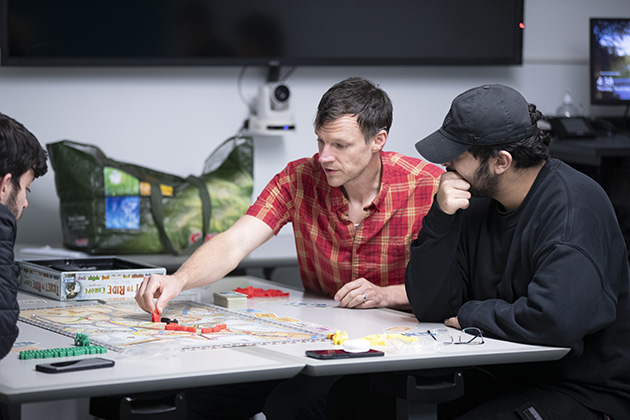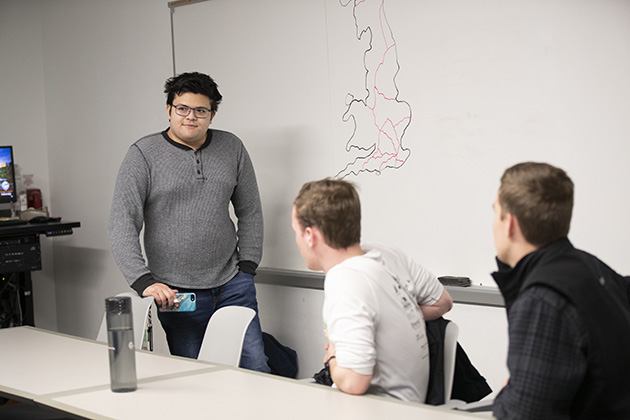When you walk by Dennis Adams’s classroom, it looks more like a group of friends hanging out, playing board games and getting a bit too competitive than a college class. It’s no surprise that the course, History of Commerce Through Board Games, has become one of the most popular Honors College colloquia.
Adams, an instructor in the College of Business, first conceived of the concept for the class after learning from a colleague that he could teach an honors colloquium on any crazy topic he wanted. Inspired by his colleague’s course on comic books, Adams decided to create a class using board games. Searching for a central academic theme, he realized that many board games, especially newer European games that students may not be as familiar with, featured commerce as a central component. He first taught the class in fall 2019. After a hiatus during the year when all classes were offered remotely – he didn’t think he could recreate the experience of playing board games over Zoom – the class is back in person and has become immensely popular. It is offered every term and fills quickly with eager students.

Each class is divided into two parts. During the first section, a group of students gives a short presentation on that week’s historical commerce topic, such as currency, commodities or trade. During the second part of class, students break into small groups and play a board game that highlights the week’s theme, such as Carcassonne, Ticket to Ride Europe or Seven Wonders.
At the beginning of the term, students break into groups and help determine how the class will be structured, setting up groups for the presentations and the gameplay. He enjoys how students put their own spin on the class each time it runs. One term, they decided to keep score of who won each week, with the student winning the most games at the end of the term earning a prize. Other terms, students decided to use props and food in their class presentations.
Adams likes to let the students direct the class, in a choose your own adventure path that reflects the structure of a board game. Rather than assign readings to prepare students for class, he asks each student to share something about the class’s topic or time period that they found interesting, which leads into a class discussion. Since the students lead the conversation, each term is unique, and Adams often learns something new alongside the students. Fourth-year engineering student Ian Replinger enjoyed this approach, describing it as “totally different from my engineering classes” and noting that one of his favorite aspects of the class was listening to “my peers’ quite funny takes on different concepts.”

Adams enjoys how board games allow students to act and participate in the class in a way they can’t in other courses. “Playing a board game, students can take risks and be misleading and competitive, things they can’t normally do,” he says. While some students, like Replinger, take board games very seriously and try to win, others just appreciate the chance to do something fun outside of their usual course of study.
Ultimately, Adams aims to create a low-key atmosphere in the class, encouraging students to step out of their comfort zone through presenting and interacting with other students by working in groups and playing games. He says his goal for students in the class is to “gain confidence through taking risks and making mistakes.”
By Kate McHugh, Honors College Public Information Representative
CATEGORIES: All Stories Community Courses and Faculty Experience Homestories